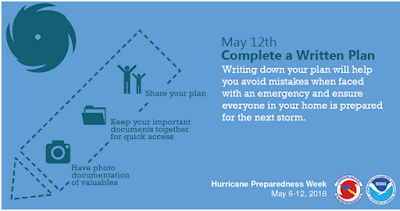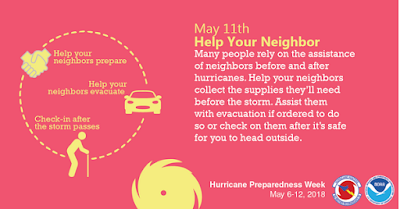Note: September is National Preparedness Month . Follow this year’s campaign on Twitter by searching for the #NatlPrep hash tag.
This month, I’ll be rerunning some edited and updated older preparedness essays, along with some new ones.
#13,488
We are still probably at least 36 hours away from knowing with any certainty whether, and where Florence - currently a tropical storm, but expected to re-intensify into a major hurricane - will threaten the Eastern Seaboard of the United States late next week.
Long range models increasingly point in that direction, but are not terribly reliable more than 5 days out. The 11am Advisory and discussion from the NHC, states (emphasis mine):
Key Messages:
1. Regardless of Florence's eventual track, large swells will begin to affect Bermuda later today and portions of the U.S. East Coast this weekend, resulting in life-threatening surf and rip currents.
2. The risk of other direct impacts associated with Florence along the U.S. East Coast next week has increased. However, there is still very large uncertainty in model forecasts of Florence's track beyond day 5, making it too soon to determine the exact location, magnitude, and timing of these impacts. Interests near and along the U.S. East Coast should monitor the progress of Florence through the weekend and ensure they have their hurricane plans in place.
FORECAST POSITIONS AND MAX WINDSWhile I certainly hope none of us will have to deal with any of these threats, this weekend could be the last weekend that millions of people will have to prepare, should Florence take aim at the east coast next week.
INIT 07/1500Z 25.0N 51.8W 55 KT 65 MPH
12H 08/0000Z 24.9N 52.8W 55 KT 65 MPH
24H 08/1200Z 24.9N 54.0W 55 KT 65 MPH
36H 09/0000Z 24.9N 55.1W 60 KT 70 MPH
48H 09/1200Z 25.1N 56.2W 65 KT 75 MPH
72H 10/1200Z 25.9N 59.8W 90 KT 105 MPH
96H 11/1200Z 27.5N 65.5W 110 KT 125 MPH
120H 12/1200Z 30.0N 72.0W 115 KT 130 MPH
And frankly, if you wait until the forecast path is settled, you could find yourself standing in front of empty shelves, with nary a flashlight, a battery, or case of bottled water to be had.That is precisely what happened last year in Florida, a full 5 days before Irma hit. With the storm still 1000 miles east of Miami, on Sept 6th, 2017 I wrote:
If you live in Florida you already know that most store shelves were stripped of bottled water, flashlights, batteries, and other hurricane supplies by early afternoon yesterday.
I talked to friends in Tampa, Orlando, and Apopka last night - all 200+ miles north of Miami - and heard identical stories of long lines and empty shelves from each location. This mad rush to stock up happens before every storm, and while there are always last minute items to get, much of it could be avoided if people prepared at the start of the hurricane season.
Ideally, if you live in hurricane country, you already have your hurricane preps in order. Living in Florida, I make it a point to get ready in May. But even so, there are always last minute items to take care of.
As they do every year, the National Weather Service and the National Hurricane Center promoted National Hurricane Preparedness Week last May. Some excerpts from this year's campaign follow:
Hurricane Preparedness Week, May 6-12, 2018
And this advice from the National Weather Service:
What to Do Before the Tropical Storm or Hurricane
The best time to prepare for a hurricane is before hurricane season begins on June 1. It is vital to understand your home's vulnerability to storm surge, flooding, and wind. Here is your checklist of things to do BEFORE hurricane seasons begins.When it comes to getting the latest information on hurricanes, your first stop should always be the National Hurricane Center in Miami, Florida. These are the real experts, and the only ones you should rely on to track and forecast the storm.
- Know your zone: Do you live near the Gulf or Atlantic Coasts? Find out if you live in a hurricane evacuation area by contacting your local government/emergency management office or by checking the evacuation site website.
- Put Together an Emergency Kit: Put together a basic emergency. Check emergency equipment, such as flashlights, generators and storm shutters.
- Write or review your Family Emergency Plan: Before an emergency happens, sit down with your family or close friends and decide how you will get in contact with each other, where you will go, and what you will do in an emergency. Keep a copy of this plan in your emergency supplies kit or another safe place where you can access it in the event of a disaster. Start at the Ready.Gov emergency plan webpage.
- Review Your Insurance Policies: Review your insurance policies to ensure that you have adequate coverage for your home and personal property.
- Understand NWS forecast products, especially the meaning of NWS watches and warnings.
If you are on Twitter, you should also follow @FEMA, @NHC_Atlantic, @NHC_Pacific and @ReadyGov.
Even if we get lucky, and Florence turns out to sea, there are at least two additional tropical contenders behind it in the Atlantic, and we are just barely past half-way through the hurricane season.
So if you haven't already done so, this weekend is probably a very good time to prepare - even if you don't live in hurricane country - because disasters can happen anytime, and anywhere.
And once a disaster becomes apparent, you are probably too late do much about it.








